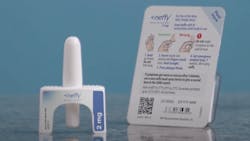Neffy: What dental providers should know about the new epinephrine nasal spray for allergic reactions
In August 2024, the FDA approved neffy (epinephrine nasal spray) as a new solution for treating type 1 allergic reactions, including anaphylaxis, in adults and children weighing 66 pounds or more. For patient safety in emergency situations, it’s critical for dental professionals to understand this new, needle-free option.
Key benefits of neffy for dental providers
- Needle-free administration: Neffy offers a nasal spray alternative to traditional epinephrine auto-injectors, making it easier for patients and providers who may be uncomfortable using injections during a high-stress allergic reaction.
- Quick acting: Similar to intramuscular injections, neffy takes effect within one minute to help restore normal blood pressure and heart rate.
- Affordable: It’s priced at approximately $199, 76% less than most injectable epinephrine products, which can retail for more than $800. This makes neffy a cost-effective option for both patients and providers.
- Accessible for patients: It’s easier for needle-phobic patients and is a great option to recommend when discussing emergency preparedness for patients with known allergies.
Using neffy
- Dosage: Each neffy package includes two single-use nasal inhalers. It's crucial to carry both, as a second dose may be required. Note: If symptoms persist after the first dose, administer the second spray in the same nostril five minutes later.
- Patient positioning: It can be administered in any patient position—sitting, standing, or lying down—making it versatile for emergency scenarios in the dental chair.
- Post-use: Always seek emergency medical treatment to ensure the patient receives any additional necessary care.
Storage guidelines for neffy
- Room temperature: Neffy should be stored at room temperature, but it can withstand brief exposure to temperatures up to 122°F.
- Never freeze: If it’s ever frozen, neffy will no longer deliver epinephrine effectively, so ensure it's stored properly in your emergency kit.
- Long shelf life: With a shelf life of 30 months, neffy provides a long-term, reliable option for emergency preparedness in the office.
Potential side effects of neffy
Patients may experience mild side effects such as throat irritation, nasal discomfort, headache, jitters, tremors, and nasal congestion. Less frequently, patients might encounter dizziness, nausea, or abdominal pain. These effects are typically moderate and short-lived. Additionally, after using neffy, patients may notice changes in the nasal lining for up to two weeks, which could enhance the absorption of other nasal medications.
Special considerations
In cases of anaphylaxis, epinephrine must be administered immediately, even for patients with heart conditions. Although epinephrine can exacerbate issues such as arrhythmias or angina, delaying treatment poses a greater risk. Providers should administer neffy promptly and monitor heart patients closely, especially those taking cardiac medications such as diuretics and antiarrhythmics, for any adverse effects following administration.
Final takeaways
Neffy’s approval introduces a new era in allergy management. For dental professionals, it provides a life-saving option that’s easier to use, more affordable, and accessible for patients and providers. Stocking neffy in your emergency kit enhances patient safety and ensures you're prepared for any allergic emergencies.
Make sure your team is familiar with this new option and well-equipped to manage anaphylaxis in your practice. To help ensure the highest standard of care for your patients, stay informed about life-saving medications and use resources such as the Digital Drug Handbook to keep track of drug interactions.
About the Author

Barbara Madej, RPh
Barbara Madej, RPh, is the chief science officer at MedAssent DDS. She has a passion for improving lives through education on proper medication use. After earning her pharmacy degree from the University of Saskatchewan, Barbara has served both Canada and Los Angeles. Through MedAssent DDS, she aims to reduce medication errors at the intersection of dentistry and pharmacy, enhancing workplace efficiency and patient safety. Her lifelong goal is to make a meaningful impact in health care for all involved.


